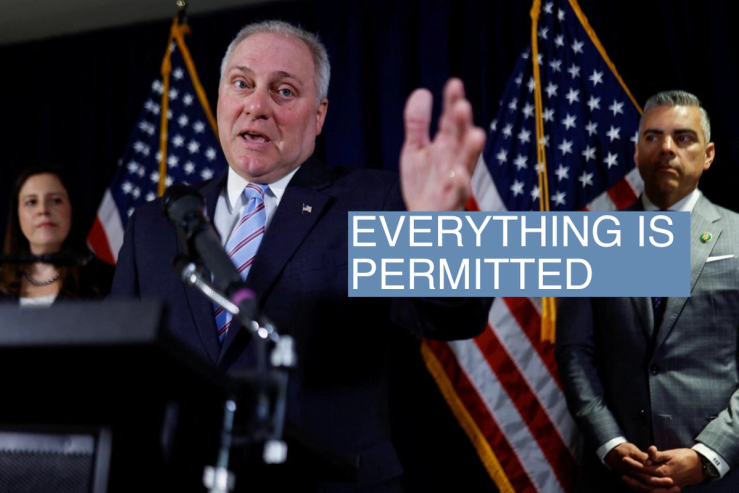The News
House Republicans are about to bring their big energy bill on the floor — a fossil-fuel friendly piece of legislation party leaders hope will rally their rank-and-file and draw a contrast with Democrats on pocket book issues like gas prices.
The measure, which will come to the floor next week, is widely expected to die on arrival in the Senate. But some believe this partisan messaging exercise could finally kickstart bipartisan progress on a rare issue that both oil and gas advocates and climate hawks see as an urgent priority — energy permitting reform.
In an interview with Semafor, House Majority Leader Steve Scalise, R-La. expressed optimism that Democrats could be pressured into supporting their bill, introduced as H.R. 1. But he made clear that individual components were also on the table.
“There’s a lot of interest on both sides of the aisle of getting permitting reform and it’s one of the big things that is holding back our ability to produce more American energy,” Scalise said as he assailed “radical policies” on the part of the Biden administration.
There are already early-stage bipartisan talks happening and Senate Majority Leader Chuck Schumer, D-N.Y. — while bashing the Republican energy proposal — has given his blessing to them. One Democratic aide told Semafor that a vote on the broad GOP bill would help clear the way for bipartisan talks to accelerate.
In this article:
Morgan’s view
The two parties will have a lot to resolve to get to a deal on permitting reform, and it might be trickier in the throes of a presidential election cycle.
The Republican bill would boost fossil fuel production while repealing Biden administration clean energy policies — a nonstarter for Democrats. But it would also enact reforms to the National Environmental Policy Act, which is often blamed for bogging down the permitting process for everything from new pipelines to wind farms. It would set timelines for finishing reviews under the law, and impose a 120-day deadline to file litigation over energy and mining projects.
Democrats like Schumer have complained that the Republican proposal does not include provisions that would make it easier to build new electric transmission infrastructure. Those reforms are widely viewed as essential to the green energy transition, which will involve connecting Americans with vast amounts of new renewable electricity. But they’re also a knotty topic for lawmakers, involving the rights of local property owners, federalism, and questions about who will ultimately pay for the cost of new infrastructure.
The Democratic aide told me that any deal on permitting reform would need to include transmission, but the aide expressed optimism about getting to an agreement.
“Transmission is vital to getting clean energy from where it is produced to where people live, but the Republicans’ H.R. 1 proposal leaves this problem untouched. It’s one of the major things we must do this year,” Schumer said on the Senate floor Tuesday.
Scalise didn’t directly answer when asked whether Republicans could get behind a permitting reform deal that addresses Democratic calls to speed up a transition to energy sources outside of fossil fuels.
“Our country is going to continue needing more energy of all kinds and this idea that you can just get rid of one very reliable and efficient form of energy and replace it with a more expensive and less efficient form of energy is ludicrous,” he said.
Reps. Bruce Westerman, R-Ark. who chairs the House Committee on Natural Resources, and Scott Peters, D-Calif. are among those involved in bipartisan talks. Sen. Joe Manchin, D-W.Va., who unsuccessfully pushed for a bipartisan permitting reform measure last Congress, is also a key player to watch.
A Westerman spokesman told me the congressman has talked with Manchin and is optimistic about some “bipartisan magic” in the near future.
In the meantime, the decision by Republicans to prioritize H.R. 1 is a sign that they think they can win the messaging war on energy and the price at the pump.
The View From Steve Scalise
Scalise previewed some of the GOP messaging around the legislation, arguing it would lower fuel costs by stepping up fossil fuel production while Democrats’ clean energy agenda would make the U.S. more dependent on foreign countries for oil and gas in the future. “By having an actual roll call vote on important legislation, everybody in the country gets to see who is for and against lowering energy costs and standing up for hard-working families,” he said.
Scalise said Republicans hope to put pressure on the Senate with the legislation, arguing it could follow a similar path as a bill overturning changes to the D.C. criminal code that initially encountered resistance from the White House but that President Joe Biden later said he would sign.
“It comes out of the House, then I think people are going to start asking questions to their senators whether or not they would support this bill and they’re going to see that it would lower energy costs and allow us to make more things in America,” Scalise said.
Notable
- While energy companies have lauded the GOP bill for taking a stab at permitting reform, Politico reports that industry insiders privately “say the ideas included in the House bill to overhaul permitting rules miss the point and would do little to help advance major projects.”


